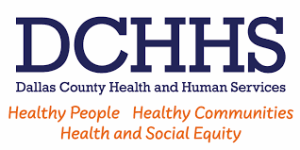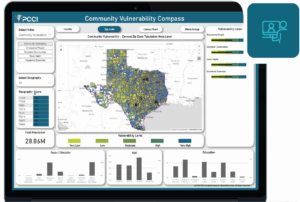
University Health Transplant Institute partners with Parkland Center for Clinical Innovation to implement innovative data management to improve patient outcomes
Dallas, Texas – University Health Transplant Institute, dedicated to restoring health and life to patients with organ failure through prevention treatments and transplantation services, is partnering with the Parkland Center for Clinical Innovation (PCCI). The goal of this partnership is to improve care and outcomes by combining artificial intelligence with clinical expertise, to enhance the Transplant Institute’s digital data environment allowing for enhanced data access and advanced analytics to enable transformative innovation and high-impact research.
Currently in the implementation phase, PCCI is expanding University Health’s capabilities based on deploying PCCI’s innovative, cloud-based, digital data environment, ISTHMUSTM, and leveraging PCCI’s Community Vulnerability Compass (CVC), a non-medical drivers of health (NMDoH) data integration and visualization tool enabling deeper understanding of the context and complexities of the social barriers to health, access and well-being of Transplant Institute patients. The CVC uses 26 clinical and socio-economic indicators clustered into four thematic domains denoting the health, resiliency and economic vibrancy of neighborhoods. The first application of these innovative digital technologies and enriched data assets was the launch of the industry-leading Transplant Quality and Research DataMart, an important collaboration between University Health Transplant Institute and PCCI.
“With the rollout of PCCI’s Transplant Quality and Research DataMart, these projects will take just hours to complete. This reduced time to make data available to our fabulous team, in turn, will speed up our research and quality processes by enabling our physicians and staff to access data exponentially faster as they work to save more lives.” – Francisco G. Cigarroa, MD, Professor of Surgery and Director, Alvarez Transplant Center
In partnership with UT Health San Antonio, the University Health Transplant Institute is one of the top five U.S. transplant centers based on survival outcomes in kidney, liver, and lung transplantation. Its innovations in clinical practice and management have driven utilization of higher-risk donor organs and expanded opportunities for more patients to receive lifesaving transplantation. The Transplant Quality and Research DataMart will be able to place equitable data insights in the hands of research and care teams, while serving as a catalyst to new breakthroughs in understanding barriers and their impact to health, and ultimately providing higher quality of care to residents of Bexar County and beyond.
“We are proud to support University Health and its mission to provide high impact and innovative care,” said PCCI CEO, Steve Miff, PhD. “Our work will support University Health’s position as a leader in the transplant field with the implementation of a digital data environment and a transplant quality and research DataMart. This will allow the University Health Transplant Institute team to enhance and extend research and outcome studies and expand cross-industry collaborations. Adding CVC, our advanced NMDoH analytics tool, University Health will be better able to understand the NMDoH for their whole transplant population and better serve and provide enhanced access and support for their patients across the state.”
“Our Transplant DataMart is the first of its kind to use data from a large transplant program in a standardized cloud-based format by incorporating clinical metrics and non-medical drivers of health that are connected to a network of databases and other researchers across the world. This unique system will help us improve outcomes for transplant patients, perform advanced analytics, reduce barriers to care and increase grant and research opportunities to expand and share our work,” said Bryan Alsip, MD, Executive Vice President and Chief Medical Officer of University Health.
This partnership will help University Health foster additional grant and research opportunities by moving the organization into the Observational Health Data Sciences and Informatics (OHDSI) program. OHDSI is an international network of researchers and observational health databases with a central coordinating center housed at Columbia University. Integrating OHDSI, the OMOP Common Data Model, and the OHDSI software tools into the UH ISTHMUS™ ecosystem enables University Health teams’ access to the open community data standards, open-source software, and ways to apply scientific best practices to generate reliable clinical evidence.
Also, PCCI’s CVC will allow the University Health Transplant Institute to analyze a patient’s NMDoH to help make informed, equitable decisions. The CVC gives the team the ability to query a patient’s address to assess the NMDoH factors impacting that patient’s residential block group. This informs and enables more targeted screening questions and the collection of enhanced data to facilitate collaboration with community and health care organizations to support current and prospective patients throughout their transplant journey.
“University Health Transplant Institute has a 53-year history of cutting-edge innovation and superior survival rates. We are now one of the two largest living donor programs in the US and number one in survival. We also have the top survival and transplant rates for kidney and lung in our region including pediatrics. We have continually expanded access to our unique patient population through new medical techniques in lung, liver, and kidney transplantation and hepatocellular tumors and cancers,” said Francisco G. Cigarroa, MD, Professor of Surgery and Director, Alvarez Transplant Center, Malú & Carlos Alvarez Distinguished University Chair, and Ashbel Smith Professorship in Surgery.
“However, data projects to analyze and share our successes, can take us weeks or even months to complete. With the rollout of PCCI’s Transplant Quality and Research DataMart, these projects will take just hours to complete. This reduced time to make data available to our fabulous team, in turn, will speed up our research and quality processes by enabling our physicians and staff to access data exponentially faster as they work to save more lives. This in turn will lead to better outcomes and enhanced access to life-saving transplantation. This also allows us to share our successes with the transplant community around the world to make lives better,” Cigarroa added.
ABOUT UNIVERSITY HEALTH
University Health is the only locally-owned health system in San Antonio. For more than 100 years, University Health has been here to heal, improve health, train the next generation of medical professionals and ensure the people of San Antonio, Bexar County and South Texas have access to primary and advanced specialty care close to home. Specialized services include the region’s only Level I trauma center for both adults and children, and maternal and neonatal intensive care centers designated at the highest levels by the State of Texas. As the region’s only academic health system, University Health is a hub of innovation and discovery, committed to delivering patient-centered, culturally competent, high-quality and compassionate care, based on a strong foundation of outcomes‐based research and innovative teaching. Learn more at UniversityHealth.com.
About PCCI
The Parkland Center for Clinical Innovation (PCCI) is a not-for-profit, mission-driven organization with industry-leading expertise in the practical applications of artificial intelligence, machine learning and NMDOH data modeling to address the needs of vulnerable populations. PCCI started as a department within
Parkland Health and was spun out as an independent organization in 2012. PCCI strives to leapfrog the status quo by harnessing the transformative potential of data. Our unique capabilities allow us to provide innovative, actionable solutions that more effectively identify needs, prioritize services, empower providers, and engage patients.
###






